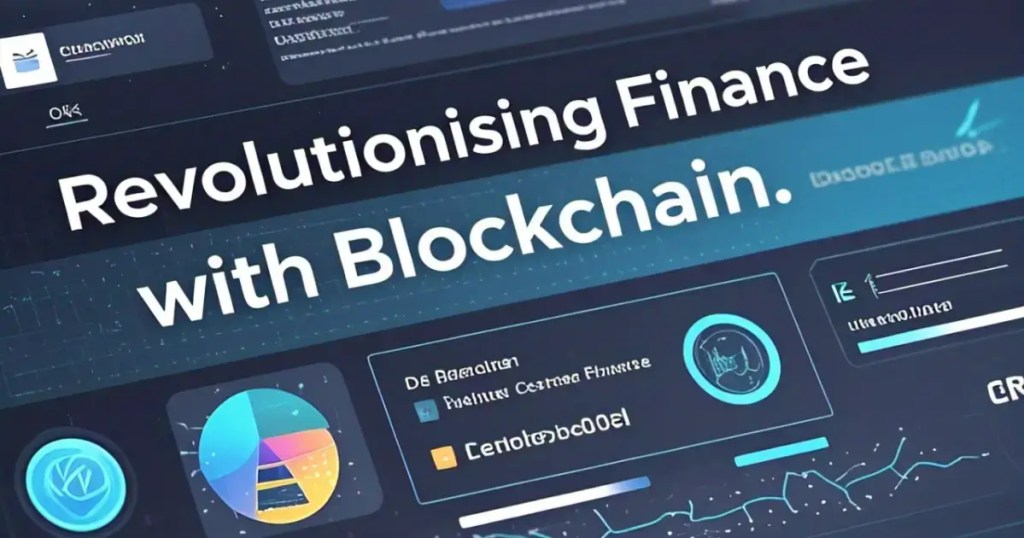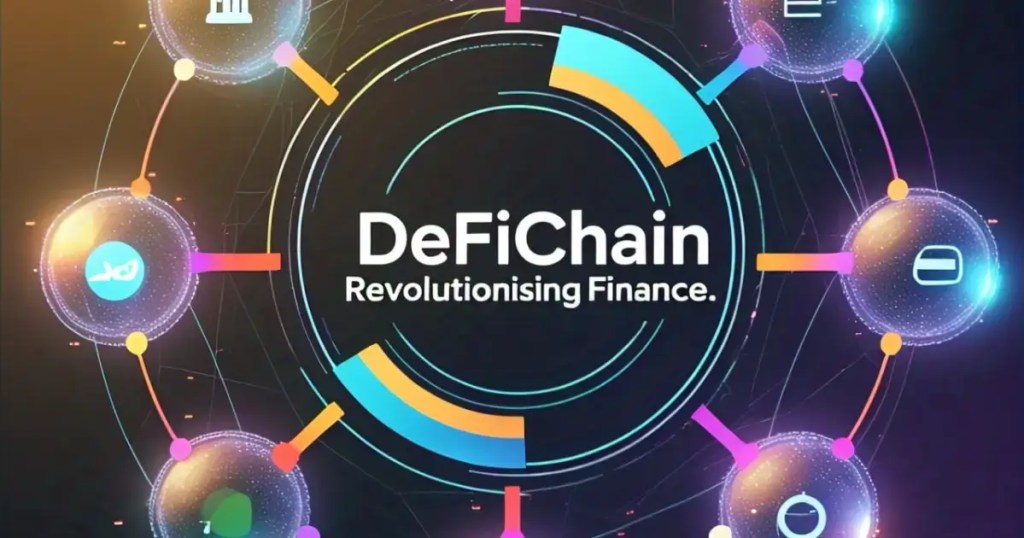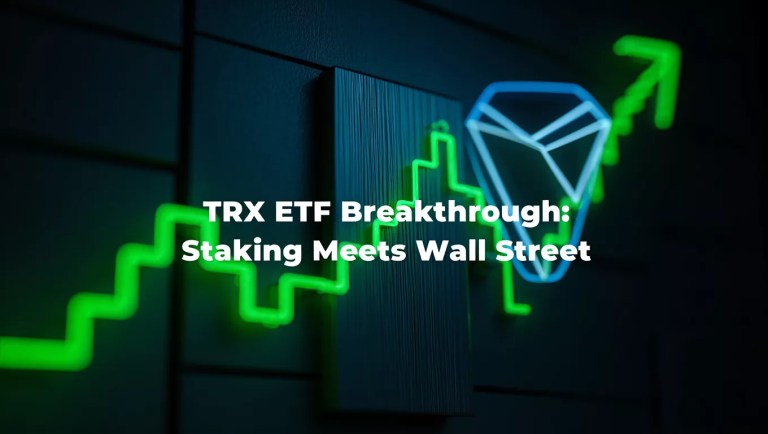
DeFiChain: The Future of Decentralised Finance & Traditional Banking
Introduction
The financial world is evolving, and decentralised finance (DeFi) is leading the charge. One of the most promising projects in the DeFi space is DeFiChain, a blockchain platform focused on decentralising traditional financial services. Offering decentralised lending, staking, and other financial products, DeFiChain seeks to eliminate the need for intermediaries, allowing individuals and businesses to access financial services more securely and efficiently.
In this post, we will explore how DeFiChain works, what makes it stand out in the crowded DeFi market, and why it’s considered a game-changer for the future of finance.

What is DeFiChain?
DeFiChain is a decentralised blockchain platform specifically designed to enable decentralised finance (DeFi) applications. It provides a suite of financial services typically offered by banks and traditional financial institutions. However, what makes DeFiChain unique is its commitment to removing intermediaries and providing transparent, secure, and accessible financial services directly on the blockchain.
The platform allows users to take part in decentralised lending, borrowing, staking, liquidity provision, and more— all while eliminating the need for banks, brokers, and other third parties. By using the power of blockchain technology, DeFiChain ensures transactions are fast, secure, and free from central control.
Why DeFiChain is Promising
The decentralised finance market has seen explosive growth in recent years, with an increasing number of individuals and institutions turning to blockchain-based solutions for financial services. DeFiChain is tapping into this expanding market by combining blockchain’s decentralisation and transparency with the familiarity of traditional financial services.
1. Decentralisation Without the Middleman
DeFiChain’s biggest selling point is its ability to provide decentralised financial services without the need for intermediaries. Traditional financial services, such as loans, staking, and investments, rely on third parties like banks and brokers to facilitate transactions. These intermediaries introduce delays, fees, and the risk of central control.
By eliminating these intermediaries, DeFiChain offers users more control over their financial assets and transactions. Smart contracts on the DeFiChain network ensure that all actions are executed automatically and according to predefined rules, reducing the risk of human error or manipulation.

2. Decentralised Lending and Staking
One of the key features of DeFiChain is its decentralised lending platform. Instead of relying on banks to provide loans, users can lend or borrow funds directly on the blockchain, often at more competitive rates. These loans are backed by collateral in the form of cryptocurrency, ensuring security and reducing the risk of default.
DeFiChain also offers staking opportunities, allowing users to participate in the network’s consensus mechanism and earn rewards for helping to secure the blockchain. This gives users the opportunity to passively earn income on their holdings while supporting the network’s decentralisation.
3. User-Friendly Platform
Despite the complex technology behind it, DeFiChain is designed to be accessible to everyone. Whether you’re an individual looking to take out a loan or a business seeking to stake your crypto assets, the platform’s user-friendly interface makes it easy to navigate.
This ease of use is key to DeFiChain’s success. By offering simple tools for users to interact with blockchain technology, DeFiChain lowers the entry barriers and makes decentralised finance accessible to a broader audience, including those who may not be familiar with cryptocurrency.
DeFiChain’s ICO and Future Impact
DeFiChain’s Initial Coin Offering (ICO) is poised to be a major milestone for the project, helping to raise funds for further development and expansion. The ICO represents an opportunity for early investors to get involved in the platform’s growth before it potentially disrupts the financial sector on a larger scale.
The ICO is expected to attract significant interest from both individual investors and institutional players who are keen to participate in the growing DeFi space. With its strong technological foundation and ambitious roadmap, DeFiChain has the potential to make a lasting impact on the financial industry.
How DeFiChain Compares to Traditional Financial Institutions
While traditional financial institutions have served as the backbone of the global economy for centuries, they are increasingly being viewed as outdated in the face of technological advancements like blockchain. The financial system is often criticised for its inefficiencies, high fees, and lack of transparency.
DeFiChain, on the other hand, promises a more efficient, cost-effective, and transparent way to conduct financial transactions. By offering decentralised services without the need for third parties, DeFiChain reduces costs and increases the speed of transactions. Moreover, blockchain’s immutable nature ensures that transactions are recorded securely and transparently, eliminating the need for trust in centralised entities.
The Road Ahead for DeFiChain
DeFiChain is just beginning its journey, and the project’s potential is enormous. As the DeFi space continues to grow, DeFiChain will likely play a key role in shaping the future of finance. With its focus on decentralised lending, staking, and other financial services, DeFiChain is well-positioned to be a major player in the blockchain-based finance sector.
Conclusion
DeFiChain represents a powerful shift in the way we think about finance. By combining the decentralisation benefits of blockchain with the functionality of traditional financial services, DeFiChain is opening up new possibilities for individuals and businesses alike. With its ICO on the horizon and a clear roadmap ahead, DeFiChain has the potential to be a cornerstone of the future financial system.
Secure Your Crypto with a Cold Wallet
Keeping your crypto safe is more important than ever. With the rise of ETF staking and institutional adoption, protecting your Ethereum and other digital assets should be a top priority.
A cold wallet ensures that your funds remain safe from hacks, scams, and online threats. Unlike hot wallets, which are connected to the internet, cold wallets keep your private keys offline, offering maximum security.
🔒 Top Cold Wallets to Consider:
👉 Ledger Stax – A next-gen E Ink touchscreen wallet designed for seamless crypto security.
👉 Trezor Safe 5 – A highly secure hardware wallet with advanced protection features.
Don’t leave your crypto at risk. Invest in a cold wallet today and take control of your digital assets! 🚀
contact us
Glossary of Terms
Blockchain
A distributed ledger technology that records transactions across multiple computers. It ensures that records cannot be altered retroactively, providing transparency and security.
DeFi (Decentralised Finance)
A movement within the cryptocurrency space that aims to recreate traditional financial services, such as lending, borrowing, and trading, using blockchain technology, without relying on intermediaries like banks.
ICO (Initial Coin Offering)
A fundraising method where new cryptocurrencies or tokens are sold to investors in exchange for capital to develop a project or platform.
Lending
The act of providing funds to a borrower in exchange for repayment with interest, which is facilitated in the case of DeFi through smart contracts rather than banks.
Staking
The process of holding cryptocurrency in a wallet to support the security and operations of a blockchain network in return for rewards.
Smart Contracts
Self-executing contracts with the terms of the agreement directly written into lines of code. Smart contracts automatically enforce and execute the terms once predefined conditions are met.
Cryptocurrency
A digital or virtual form of currency that uses cryptography for security. Unlike traditional currencies, cryptocurrencies are decentralised and typically operate on blockchain technology.
Liquidity
The ability to buy or sell an asset without causing significant price changes. In DeFi, liquidity refers to the availability of funds in decentralised exchanges and platforms.
Collateral
An asset pledged by a borrower to secure a loan, which can be seized if the borrower defaults on the loan.
Decentralised Exchanges (DEXs)
Cryptocurrency exchanges that operate without a central authority, allowing users to trade directly with each other via smart contracts.
APY (Annual Percentage Yield)
A measure of the interest earned on staked or invested assets, calculated over a year, including compound interest.
Yield Farming
The process of earning rewards or interest by providing liquidity to decentralised finance platforms, typically by staking tokens or participating in liquidity pools.
Gas Fees
Transaction fees required to perform operations on a blockchain, such as transferring tokens or interacting with smart contracts. Gas fees are paid to miners or validators who process transactions.
Consensus Mechanism
The process by which a blockchain network agrees on the validity of transactions. Common mechanisms include Proof of Work (PoW) and Proof of Stake (PoS).
Tokenomics
The study and design of the economic system around a cryptocurrency token, including its supply, distribution, and incentives.
Node
A computer that participates in the blockchain network by validating and relaying transactions. Nodes ensure the integrity and decentralisation of the blockchain.
Wallet
A digital tool used to store and manage cryptocurrency. Wallets can be hot (online) or cold (offline) and are used to send, receive, and store digital assets.
Governance
The process by which decisions regarding the development and changes to a blockchain or platform are made. In DeFi, governance is often decentralised, with token holders voting on proposals.
Fungible Tokens
Tokens that are interchangeable and identical in value, such as Bitcoin or Ethereum, where each unit is equal in value to every other unit.
Non-Fungible Tokens (NFTs)
Unique digital assets that represent ownership of a specific item, artwork, or piece of content, often used in digital art, collectibles, and gaming.
Decentralised Autonomous Organisation (DAO)
A self-governing organisation that operates through smart contracts and community voting, with decisions made by token holders rather than central authorities.
Transaction Fees
Charges incurred when sending cryptocurrency from one wallet to another, or when interacting with decentralised applications (dApps). These fees are typically paid in the native cryptocurrency of the blockchain.
Validator
A participant in a Proof of Stake (PoS) blockchain who confirms the validity of transactions and is rewarded for their participation in maintaining the network.








